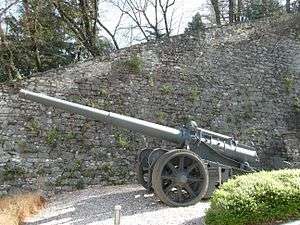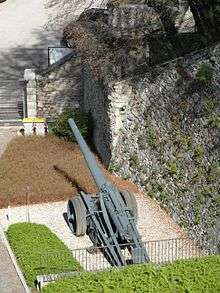Canon de 155 L modele 1916 Saint-Chamond
Canon de 155 L modele 1916 Saint-Chamond was a French heavy artillery piece designed and produced during the First World War. A number were still on hand during the Second World War in French, Italian and German service.
| Canon de 155 L modele 1916 Saint-Chamond | |
|---|---|
 A 155 L mle 1916 at the Italian War Museum in Rovereto. | |
| Type | Heavy artillery Coastal Artillery |
| Place of origin | |
| Service history | |
| In service | 1916-1945 |
| Used by | |
| Wars | World War I World War II |
| Production history | |
| Designer | St Chamond |
| Designed | 1916 |
| Manufacturer | St Chamond |
| Produced | 1916 |
| No. built | 152? |
| Variants | Canon de 145 L modele 1916 Saint-Chamond |
| Specifications | |
| Mass | Travel: 14,000 kg (31,000 lb) Action: 13,150 kg (28,990 lb) |
| Barrel length | 7.3 m (23 ft 11 in) 47.5 caliber[1] |
| Shell | Separate loading charge and projectile |
| Shell weight | 43 kg (95 lb) |
| Caliber | 155 mm (6.1 in) |
| Breech | Interrupted screw |
| Recoil | Hydro spring |
| Carriage | Box trail |
| Elevation | 0° to +38° |
| Traverse | 6°[1] |
| Rate of fire | 3 shots every two minutes |
| Muzzle velocity | 790 m/s (2,600 ft/s) |
| Maximum firing range | 21.3 km (13.2 mi)[1] |
History

As the First World War settled into Trench Warfare on the Western Front the light field guns that the combatants went to war with were beginning to show their limitations when facing an enemy who was now dug into prepared positions. Indirect fire, interdiction and counter-battery fire emphasized the importance of long range heavy artillery.
In order to address the French Army's lack of long range heavy artillery a number of surplus Canon de 138 mm Modèle 1893 and Canon de 138 mm Modèle 1910[2] Naval Guns were converted to land use by the French company St Chamond. This was accomplished by boring the barrels out to 145 mm (5.7 in) and placing them on simple single-axle box trail carriages. The result of this conversion was known as the Canon de 145 L modele 1916 Saint-Chamond or L 16 St Ch for short.[1]
As barrels became worn they were sent back to the manufacturer to be re-bored to use standard 155 mm (6.1 in) ammunition and re-designated as the Canon de 155 L modele 1916 Saint-Chamond. These new guns continued to use the same carriages as the 145 mm guns and had similar performance with a heavier 43 kg (95 lb) projectile. After the First World War an unknown quantity were sold to Italy where they were known as the Cannone da 155/45 PB. The 152 guns remaining in french service were placed in static positions in the coastal artillery role. The Germans gave French guns the designation 15.5 cm K 420(f), while Italian guns were given the designation 15.5 cm Kanone 420(i).[1]
References
- Chamberlain, Peter (1975). Heavy artillery. Gander, Terry. New York: Arco. p. 13. ISBN 0668038985. OCLC 2143869.
- "Canon de 145/155 Saint Chamond modèle 1916 | clausuchronia". clausuchronia.wordpress.com (in French). Retrieved 2017-10-17.